by Aishwarya Balasubramanian
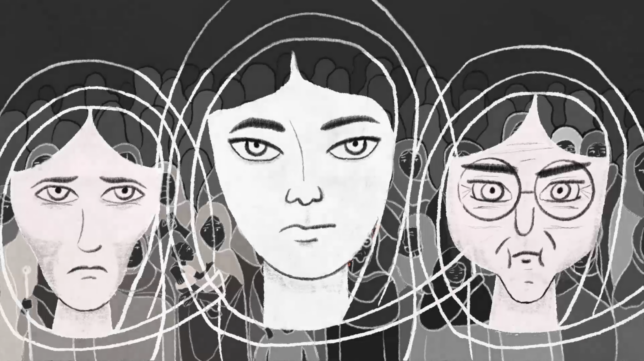
Partition- it never sounded like the great successful glory it was broadcasted as in the history books of India when I was learning from my school. At least to me. The strangest bit is, that partition stories as stories were never covered in my curriculum. There was just one sentence: India gained Independence from British Raaj on the eve of 15 August 1947. I ask you, my readers, will you really call that Independence? Because my eyes took it as the one striking symbol of further pain, misery and dislocation of interests between India and Pakistan. But I had no friends and community to discuss these themes in. Let me introduce myself. I am Aishwarya and this introduction is for anyone new to my blogs. I worked on a long-term placement with GWL and it’s been marvellous and transforming after working in a space that actively works to unearth vital stories and vital voices. On that placement, I was introduced to Syma, the Black Asian Minorities and Ethnic Officer (BAME) in GWL who has been an instrumental person in my life by providing me immense opportunities to watch shows, scripts and creative writing and creative art spaces to begin exchanging memories, attitudes and South Asian heritage. Syma has been that person who has helped me reconnect with a part of India that makes me viscerally voice out every terrible thing clothed over by the ‘happening of independence and exiting of British rule’. You want to know my version of a successful end to that rule? It would be a world without that partition.
GWL’s ‘looking back to look forward’ has been a guiding star in all my learnings in this past year, that when my placement ended, I didn’t stop myself from complex learnings, connecting with communities and thriving in them. In due time, I came across Amina’s Upward: Young Women On The Rise Programme for young BME women aged between 16 and 22 years old and yes, I am one of these women now. An Upward woman. It aligns with what I am looking for – exposure, education and resources to tackle violence against women and interact with socio-judiciary spaces. It strengthens my connection with my South Asian heritage. While this spectacular programme began to take shape in June this year, I came across ‘Lost Voices of Partition’ on Eventbrite which comprised of a group of participants responding in any way to the heritage, nostalgia and stories involved of India-Pakistan and yes, Bangladesh, in the partition since the 1947s. Syma and I have had many conversations around our shared heritage, the scope of holding partition workshops and the simple importance of this grave history that we share, very intimately with Britain. I believe it is important that the colonial ruler and colonial history is not sugarcoated with themes of glory and great conquer. As a South Asian woman, I feel no more tolerance for the terrible consequences due from the 200 plus colonisation and the ghastly partition and I want to see this big part of my history acknowledged and talked about inside more conversations. Hence, I had no hesitation in signing up for the first of these ‘Lost Voices of Partition’.
In this wonderful workshop facilitated by Syma, Safa Yousaf from Amina who is one of the persons who has brought the Upward Programme come to life, Dr Nafhesa Ali had an incredible presentation to share with us on the history of partition and the curriculum content covered about it in most learning institutions in the United Kingdom. I was a bit stunned to have my fears confirmed that students in schools in the UK are not taught the history of Britain being one of the deadliest and strategic coloniser who has left ancestral trauma and scars that continue to irk in the minds, at least I can vouch for this, in the minds of Indians. Nafhesa is a lecturer in Sociology and an interdisciplinary sociologist with an expertise in migration and the everyday lives of racialised and minority communities (Northumbria University Newcastle). This workshop was attended by myself and some Upward Girls. It was another opportunity for me to work in a workshop together and have a chance of hearing what other young women of my generation thought about partition. We made zines together, each of us, which stands out as an activity of creativity and imagination towards unearthing our memories and responses using art. Nafhesa has a strong hold over her knowledge and enlightened me with facts with confidence and charisma. The workshop gently nudged me to flesh out ideas, phrases and feelings that started to appear in my mind while Nafhesa was continuing with the presentation. As we began the process of zine making, I and Syma showed the rest of the group on how to prepare a zine folding as I have recently begun my journey of zine making since May.
Each of us had an intricate story to unfold on the themes of silence, migration, displacement, relocation, hands being pulled apart from each other and friendships, lost in time. The other visceral themes that came out were ‘women being encouraged to jump in their home well to protect the family honour’, women’s bodies being used as retaliation weapons through rape, mutilation and abduction. Uncountable families lost each other, uncountable killings took place, uncountable babies were left behind, uncountable people were compelled to walk on foot for long hours to escape either the parts of Pakistan and head to India or escaping the parts of India to migrate to Pakistan and also, uncountable migrations took place towards Britain, the former colonial power. For me, knowing about these massacres only in this past year, has been shocking and truly challenging to process. One of the things covered in that presentation has been Shiza’s experiences of her placement with GWL. I came across Shiza while I was on my placement and I have seen them working with passion and zest towards community outreach, closely with Syma, and working with groups of participants on intergenerational workshops. To have their perspective and experiences in my mind was helpful in many ways. It told me that changemaking in communities can be brought on by young women and the barriers between generations can be reduced and different generations are capable of working together in harmony and with a direction.
Throughout my blog you will get to look at specific pages of all our zines that I hope, will churn your minds into thinking more reflectively into the history around colonisation and partition. Not with aimless anger. But rather, a constructive rage that will make you think about your own ideas and visions of being part of cross-cultural conversations like these. I happily encourage you to be part of this journey which I assure, will be both revealing and uplifting individually and as a communal power. Let’s ignite a communal power that does not burn down houses such as what took place in the gruesome events following partition. This communal power is for our protection, growth and togetherness so that we equip ourselves, exchange stories within families and be able to pass on these valuable conversations around and down our lifelines. Something further about me that I feel is important to share is that I am a temporary dweller in Glasgow. I study communication and media from Bournemouth University which, very unfortunately, is miles away from this city down in England. Anyone who is ready to come along to these workshops which will be regularly shared in due time on GWL’s website and social media handles, you will probably not meet me then. I am moving to Bournemouth soon to start my fourth and finally, the final undergraduate year. I am excited definitely, because I am heading down south with the desire to shake things up in Bournemouth. Gone are the days when I used to wait for changes to arrive to me due to personal constraints! Now, I am in-charge of changemaking which ignites me with both pride and an heaviness that comes with revealing truths and responsibilities.
On my own end, I am carrying the burdens that were never my burdens to bear. I would like to culminate this blog with my own responses to certain pages of those zines. I would like for you to have those responses as takeaways and sit down with those responses for some time before they begin to take shape in you and make you wonder, of the things that went wrong and unacknowledged in a lot of all our history books. My relationship with Glasgow Women’s Library has been and will remain nothing short of an uprooted tree finding back its branches, leaves and hidden powers in the roots (yes, I was that uprooted tree!). It didn’t take months, but rather, within days, I fell in love with GWL and lastly, thank you Syma for being the exceptionally driven and passionate person you are in my world. I will always, carry your fire, compassion and kindness inside me and continue to make the world we share, a more breathable space.
Before I leave, I will be participating in GWL’s South Asian heritage month on 17 August for open mic, reading out my poems exclusively written about my identity with my heritage and the partition. My Upward friends are also going to get involved and as incredible is this opportunity, it makes me more sad because this event is very likely going to be my last in-person event at my library for a long time. Until of course, I collect my savings and make my trip back to this city which has become my home and this library, my safe haven.
My responses to pages of zines:
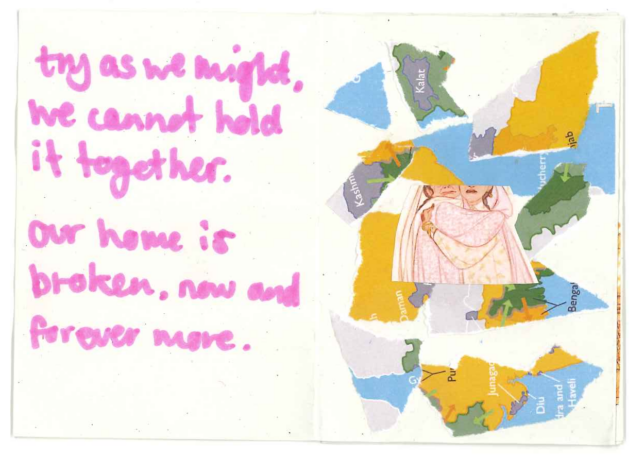
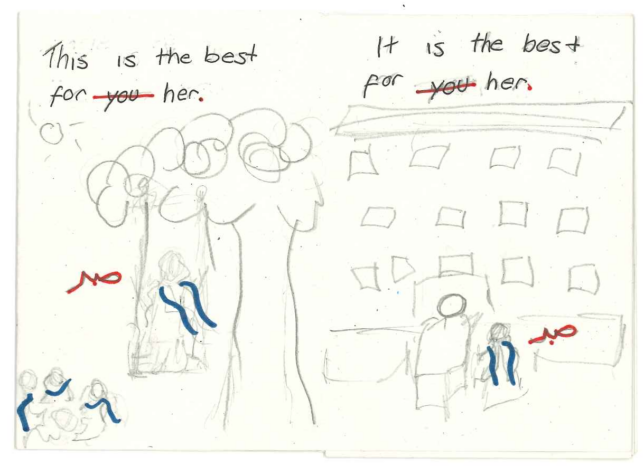
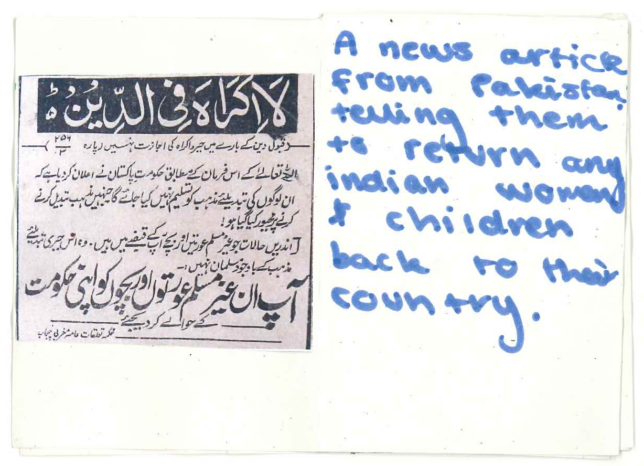
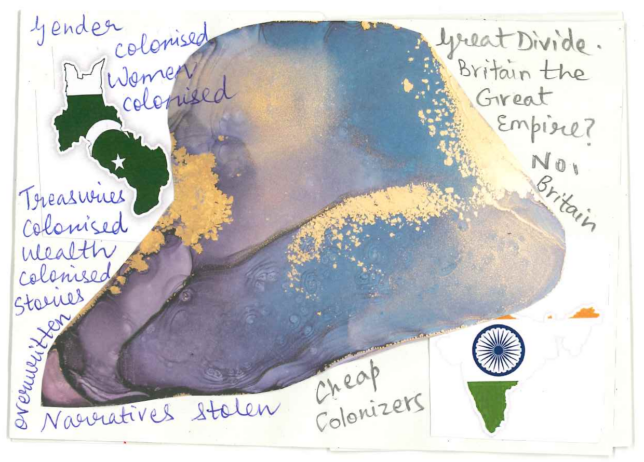
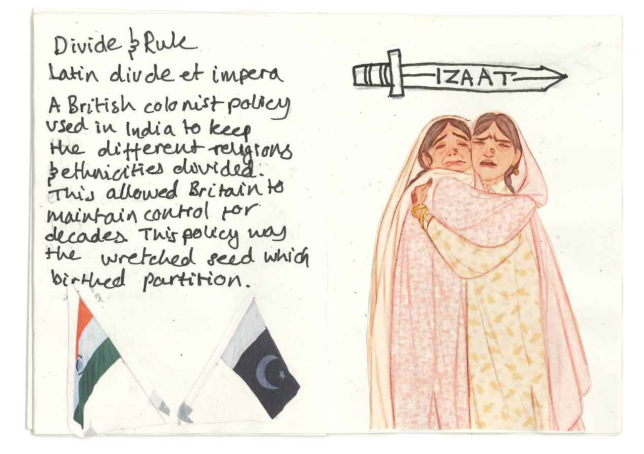
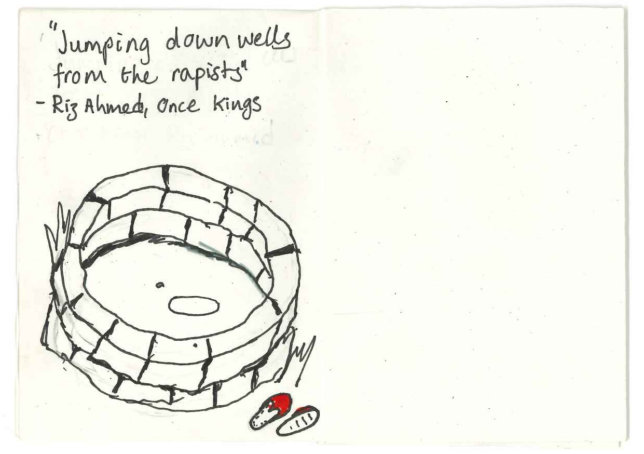
References (Feel free to dive into these resources below that are intensely detailed and significant as part of South Asian heritage displacement!):
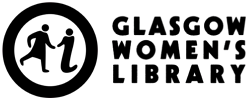
Comments are closed.